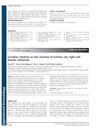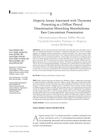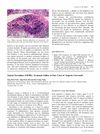 March 2014 in “Pediatric Clinics of North America”
March 2014 in “Pediatric Clinics of North America” The document discusses how to identify and manage common skin conditions in children.
34 citations,
January 2022 in “Molecules/Molecules online/Molecules annual” Natural ingredients in cosmeceuticals are beneficial for skin and hair health with few side effects.
7 citations,
August 2020 in “Genes” Different genes are active in dogs' hair growth and skin, similar to humans, which helps understand dog skin and hair diseases and can relate to human conditions.
 April 2024 in “JEADV clinical practice”
April 2024 in “JEADV clinical practice” Upadacitinib significantly improved both rheumatoid arthritis and alopecia areata in a patient.
 6 citations,
February 2003 in “Anais brasileiros de dermatologia/Anais Brasileiros de Dermatologia”
6 citations,
February 2003 in “Anais brasileiros de dermatologia/Anais Brasileiros de Dermatologia” Topical corticosteroid was not more effective than placebo for children's alopecia areata, and atopy did not change treatment results.
 24 citations,
August 2017 in “Prostaglandins & Other Lipid Mediators”
24 citations,
August 2017 in “Prostaglandins & Other Lipid Mediators” CRTH2 antagonists might be useful for treating many conditions because they play a role in immune and inflammation responses.
 8 citations,
March 2014 in “Experimental Dermatology”
8 citations,
March 2014 in “Experimental Dermatology” Light and temperature affect the daily skin function rhythms in hairless rats, with temperature influencing water loss but not skin hydration.
 2 citations,
August 1987 in “Australasian Journal of Dermatology”
2 citations,
August 1987 in “Australasian Journal of Dermatology” Birth control pills can cause skin issues but may help with acne and hirsutism, and choosing the right type can minimize side effects.
 77 citations,
July 2007 in “Dermatologic Therapy”
77 citations,
July 2007 in “Dermatologic Therapy” Methotrexate is a key, cost-effective drug for skin conditions, but requires careful monitoring for side effects.
18 citations,
August 2013 in “Journal of Feline Medicine and Surgery” Cats can get skin issues from things other than fleas, like insect bites, food, or allergens.
 89 citations,
October 1996 in “Dermatologic Clinics”
89 citations,
October 1996 in “Dermatologic Clinics” Alopecia areata is likely caused by a combination of genetic factors and immune system dysfunction, and may represent different diseases with various causes.
 4 citations,
June 2002 in “Clinical and experimental dermatology”
4 citations,
June 2002 in “Clinical and experimental dermatology” Effective treatment for hidradenitis suppurativa varies, with antibiotics commonly used and surgery as an option, but no single method is universally successful.
 39 citations,
June 2017 in “Scientific Reports”
39 citations,
June 2017 in “Scientific Reports” Different lab conditions and light treatment methods change how human skin cells respond to light therapy.
 May 2017 in “Journal of the American Academy of Dermatology”
May 2017 in “Journal of the American Academy of Dermatology” Graves' disease can cause hair loss in children and should be considered when treating pediatric alopecia areata.
 3 citations,
January 2020 in “Acta Dermato Venereologica”
3 citations,
January 2020 in “Acta Dermato Venereologica” Netherton Syndrome can cause severe skin lesions in rare cases.
 67 citations,
July 2016 in “Reviews in Endocrine and Metabolic Disorders”
67 citations,
July 2016 in “Reviews in Endocrine and Metabolic Disorders” Stress can worsen skin conditions by affecting hormone levels and immune response.
 1 citations,
May 2024 in “Türkiye klinikleri tıp bilimleri dergisi”
1 citations,
May 2024 in “Türkiye klinikleri tıp bilimleri dergisi” A rare case showed hair regrowth after chemotherapy for thymoma, suggesting a link between alopecia areata and thymoma.
 1 citations,
May 2022 in “Archiv Euromedica”
1 citations,
May 2022 in “Archiv Euromedica” Topical treatment is recommended for Folliculitis decalvans in pregnant women.
 2 citations,
January 2017 in “Clinical and medical investigations”
2 citations,
January 2017 in “Clinical and medical investigations” Herbal lotions are effective for severe hair loss, with a 64.8% success rate, but relapse is common and long-term management requires allergen control and possible corticosteroid use.

Topical corticosteroid treatment showed no significant difference from placebo in treating alopecia areata in children.
 19 citations,
September 2002 in “Acta dermato-venereologica”
19 citations,
September 2002 in “Acta dermato-venereologica” Topical tacrolimus did not regrow hair in alopecia universalis patients.
 41 citations,
September 2012 in “Cellular and Molecular Life Sciences”
41 citations,
September 2012 in “Cellular and Molecular Life Sciences” MicroRNAs play a crucial role in skin and hair health, affecting everything from growth to aging, and could potentially be used in treating skin diseases.
 50 citations,
March 2021 in “Journal of investigational allergology & clinical immunology”
50 citations,
March 2021 in “Journal of investigational allergology & clinical immunology” Dupilumab is being tested for many new skin, respiratory, and gastrointestinal conditions.
1 citations,
January 2015 in “International Journal of Pediatrics and Adolescent Medicine” Cyclosporine-A can cause excessive hair growth, which usually stops after discontinuing the drug.
53 citations,
July 2018 in “Drug design, development and therapy” Janus kinase inhibitors show promise in treating alopecia areata but need better topical formulations.
November 2018 in “Archives of clinical and experimental medicine” Acne, viral warts, and contact dermatitis are the most common skin conditions in kids at a hospital in Eskisehir, Turkey.
 1 citations,
January 2013 in “Springer eBooks”
1 citations,
January 2013 in “Springer eBooks” The document concludes that skin and nail changes can indicate various underlying health conditions.
 62 citations,
January 2003 in “Dermatology”
62 citations,
January 2003 in “Dermatology” Sunlight worsens hair loss; protect scalp.
46 citations,
July 2007 in “Journal of the American Academy of Dermatology” Alopecia areata causes significant emotional distress, including high rates of depression and anxiety.
January 2002 in “Journal of Clinical Dermatology”






















